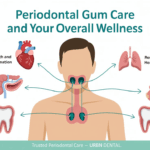Are you experiencing tooth pain or discomfort? Have you been told that you need a dental crown or are curious about your options for dental restorations? Dental crowns, also known as tooth crowns or dental caps, are dental restorations designed to cover and protect damaged or weakened teeth. They serve as a durable, long-term solution to various dental issues.
At URBN Dental, we understand the importance of dental health and offer a range of dental restoration options to ensure your smile remains healthy and beautiful. In this guide, we will walk you through the dental crown procedure and explore other dental restoration alternatives to help you make an informed decision about your oral health.The Tooth Crown Procedure
Step 1: Initial Evaluation
The dental crown procedure typically begins with an initial evaluation by one of our experienced dentists at URBN Dental. During this examination, we will assess the condition of your tooth and determine whether dental crowns are the most suitable solution. Dental crowns are recommended in the following situations:- Cracked or Fractured Teeth: If you have a cracked or fractured tooth, a dental crown can provide structural support and prevent further damage.
- Tooth Decay: Dental crowns are used to cover and protect teeth with extensive decay when a simple filling may not be sufficient.
- Weak or Damaged Teeth: Teeth weakened by large fillings or root canal therapy may require the added strength and support of a dental crown.
- Cosmetic Enhancement: Dental crowns can also be used for cosmetic purposes to improve the appearance of misshapen or discolored teeth.
Step 2: Tooth Preparation
Once it is determined that a dental crown is necessary, the next step is tooth preparation. During this phase, the dentist will:- Remove any decay or damaged portions of the tooth.
- Shape the remaining tooth to create a stable foundation for the crown.
- Take impressions of your prepared tooth to ensure a custom fit.
Step 3: Temporary Crown Placement
After tooth preparation, a temporary crown is typically placed to protect the tooth while the permanent crown is being fabricated in a dental lab. This temporary crown is usually made of acrylic and is designed to be a temporary solution until the final restoration is ready. Temporary crowns can protect your week tooth or damaged tooth until the final tooth-shaped cap is prepared.Step 4: Fabrication of Permanent Crown
The impressions taken during tooth preparation are sent to a dental lab, where skilled technicians craft a custom dental crown that matches the shape, size, and color of your natural teeth. At URBN Dental, we offer various types of dental crowns, including all-ceramic crowns, porcelain-fused-to-metal crowns, and metal crowns. Each type has its unique advantages and is chosen based on your specific needs.Step 5: Permanent Crown Placement
Once the permanent crown is ready, you will return to our office for its placement. The temporary crown is removed, and the permanent crown is bonded to your prepared tooth using dental cement. The dentist will ensure that the crown fits correctly and comfortably, making any necessary adjustments.Other Dental Restoration Options
While dental crowns are a versatile and effective restoration option, there are alternative treatments available depending on your specific dental condition:- Dental Bridges: Dental bridges are used to replace one or more missing teeth. They consist of dental crowns on adjacent teeth (known as abutment teeth) with an artificial tooth (pontic) in between. Bridges are a viable option if you have healthy adjacent teeth to support the restoration.
- Dental Implants: Dental implants are titanium posts surgically inserted into the jawbone to replace missing teeth. They serve as a foundation for crowns, bridges, or dentures. Dental implants are a long-lasting and natural-looking solution for tooth replacement. You can get a dental implant to replace the root structure of your missing tooth.
- Dental Veneers: If your main concern is cosmetic, dental veneers may be a suitable option. Veneers are thin shells of porcelain or composite resin that are bonded to the front of teeth to improve their appearance, covering imperfections like stains, chips, or misalignment.
The Advantages of Dental Crowns
Dental crowns offer several advantages that make them a popular choice for many patients:- Durability: Crowns are long-lasting and can withstand the forces of biting and chewing.
- Protection: They provide excellent protection for weakened or damaged teeth, preventing further deterioration.
- Cosmetic Improvement: Crowns can enhance the appearance of your smile by covering unsightly dental issues.
- Natural Look: Modern crowns are designed to look and feel like natural teeth, ensuring a seamless blend with your smile.
Is the Dental Crown Procedure Painful?
One common concern among patients is the discomfort associated with dental procedures. At URBN Dental, your comfort is our priority. Before the crown placement, your dentist will administer a local anesthetic to numb the area, ensuring a pain-free experience during the procedure. Most patients report minimal discomfort afterward, which can be managed with over-the-counter pain relievers.Choosing the Right Dental Restoration
Deciding on the appropriate dental restoration is a crucial step in maintaining your oral health. It is essential to consult with a qualified dentist who can evaluate your specific condition and recommend the most suitable option. At URBN Dental, we take pride in offering personalized treatment plans tailored to your needs, even for the dental crown procedure, ensuring the longevity of your smile. At URBN Dental, we are dedicated to providing top-notch dental care at multiple convenient locations throughout Houston, including Uptown Houston, Midtown Houston, Montrose, City Center, Katy, East River, and Houston Heights. If you are experiencing tooth pain, require dental restoration, or need a dental crown, do not hesitate to reach out to us. Our team is here to help you achieve and maintain a healthy, beautiful smile. Contact us today to schedule your consultation and take the first step toward optimal oral health.URBN Dental Services in Houston, TX
Houston | Katy | Montrose | West University Place | Greater Third Ward | Greater East End | North East Houston | Houston Heights | Central Northwest | Fairbanks | Acres Home | East Houston | Southeast Houston | Central Southwest | Fort Bend Houston | Brays Oaks | Meyerland Area | Sharpstown | Alief | Westchase | Memorial | Northwest Houston | Katyland | Whispering Lakes | Pine Lakes | Woodcreek Reserve















